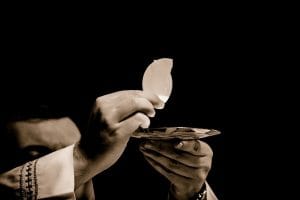Although the idea is no longer in vogue, the notion of the “marital debt” remains an important Biblical principle within Christian Marriage. Within his teaching on Marriage in 1Cor 7, St. Paul exhorts married couples to never forget this principle that follows from the vows that seal the Covenant of Marriage. Because the spouses pledge to give themselves personally, and therefor bodily to their spouse, they give their spouse rights over their body. This is especially true when it comes to the marital embrace. It is important not because spouses necessarily have to engage in the marital embrace anytime one of them feels like it, but because it is a sign that reveals something very important about the relationship between the Divine Bridegroom and His Bride.
The preferred image of Sacred Scripture for the relationship between God and mankind is that of Bridegroom and Bride. The Bible has numerous examples, most prominently that of the end of time when Christ will take His Bride into His home (Rev 19:7). The actual wedding took place when a Virgin said Yes and became a mother, offering her body so that He could take human nature to Himself. The Incarnation is the one flesh union of God and Man—what God has brought together, no man can ever draw asunder. It is consummated when Bridegroom gives up His Body for His spouse with a love that is stronger than death.
If we were to stop there, we would be leaving things on a rather generic term. Christ did not intend to consummate His marriage to mankind in general, but each man specifically; not just the Church, but each of her members. And this is where the Marital understanding of the Incarnation meets the Eucharist.

At each and every Mass, Christ states His desire to enter into a one-flesh Communion which each of the believers present. “This is My Body, given up for you” is meant to be taken quite literally as Christ giving Himself bodily to each of us. We must likewise specify our consent to enter into this communion with our Amen. To receive the Eucharist is to literally enter into a one-flesh Communion with Him, a Divine/Human marital embrace if you will. This is one of the reasons why God, when He designed marriage, and the marital embrace specifically, attached such great desire and pleasure to it. It was meant to point to the desire and joy that we experience in the heavenly consummation first and foremost. But it is also meant to be a sign of the desire and joy of the earthly consummation in the Eucharist.
The Marriage Debt and the Eucharist
All that being said, what does this have to do with the marriage debt? Through the true one-flesh union that is effected in the Eucharist, the individual believer gains the rights over Christ’s Body. These “rights” mean that they can offer Him to the Father as if the offering was their own and that there is a moral unity so that His acts become ours. The Marriage Debt ultimately allows us to fulfill the debt that each of us has to God of offering a worthy sacrifice. The Natural Law demands that we offer sacrifice to God. But no sacrifice that man offers on his own could ever fulfill this obligation. So Christ now makes such a sacrifice possible and in such a way that it is man that offers it. This is no mere substitution but an offering in spirit and truth of the made possible only through the one flesh union that occurs in the Eucharist.
The comparison then that St. Paul makes in Ephesians 5 is not just about marriage but about the Eucharist as well. It also eliminates any understanding of the Eucharist as a mere symbol. A symbol could not bring about a true Communion—only Christ truly present in the Eucharist will do.
With the one flesh union between Christ and the individual believer that occurs in the Eucharist, each person is able to give glory to God and achieve the salvation of their soul. The one-flesh union is not just a union of bodies, but a union of Persons so that the fourfold intention of Christ in the Eucharist, becomes the fourfold intention of His Bride.
Furthering the Communion
This makes the short time in which this physical union takes place, namely the time right after receiving Communion, an important time. It is the time where we further solidify our communion with Christ. We join Christ in His fourfold intention and make His acts ours. First, the Eucharist is offered as an act of adoration. Adoration is the acknowledgement of our utter dependence upon God as our Creator Who alone is worthy of supreme honor and dominion. Because it is Christ, true God and true Man, Who offers it the Eucharist is the most pleasing act of adoration to God. Likewise, the Eucharist is offered as an act of Thanksgiving for all the benefits that God has bestowed upon us. Each Eucharist can be offered for specific benefits. Third, the Eucharist is a sin offering by which are sins are forgiven. Finally, it is offered as an act of impetration asking for the necessary graces for salvation. These same graces were won by Christ and are distributed through the Eucharist.
It is in and through the Eucharist that Christ fulfills the marital debt by offering His Body to His Bride for her use. The Holy Eucharist is a nuptial Sacrament that is the greatest expression of married love.



